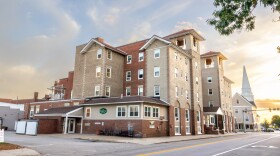There’s a duplex in the town of Hudson, set back from the road, surrounded by trees. One half is vacant; Mandy Whitaker lives in the other half. She admits it’s not much to look at.
(Editor's note: we highly recommend listening to this story.)
“I would love to think that it was, but when I have an entire attic infested with mold, my walls are infested with mold, there’s termites, there’s rot,” says Whitaker. “I mean, the sheetrock’s not even rock anymore.”
This handyman’s special is owned by the N.H. Department of Transportation. The agency purchased the property in 1995 for $115,000 in preparation for the construction of what’s known as the Circumferential Highway. To date, though, that project remains mostly mothballed.
And so for the past 20 years, the DOT has rented this home to the public.
“The house itself, it’s just old. It’s needed TLC,” says Whitaker, who is currently facing eviction for failure to pay rent on the house.
Records show that the DOT currently owns more than 100 residential and commercial properties statewide, and that it’s spent nearly $24 million on their acquisition. Some were acquired as far back as the late 1980s, either through eminent domain or through a willing purchase at the fair market rate.
“Our motive isn’t to become a landlord. We are doing the best we can to manage these properties,” says Steve LaBonte, assistant administrator within the DOT’s Bureau of Right of Way.
He says the agency would much rather be fulfilling its core mission: paving roads, filling potholes and ensuring the safety of the traveling public. Major infrastructure projects, however, require the occasional acquisition of nearby land.
If the project then gets delayed, either because of a lack of political will, funding or some other issue, the DOT is stuck holding the properties.
So, it tries to recoup its investment.
“If the property is stalled, meaning that there is still a possibility it will be needed in the future, we will hold onto the properties, and we will rent them out as best we can, as long as that’s viable,” says LaBonte.
While a home is occupied, the DOT pays local property taxes, which benefits the municipality. Once the DOT determines that it will cost more to renovate a crumbling property than it could generate in rent, the house is moved into a category called ‘offline.’
Ghost Houses
There are approximately 45 offline properties scattered around the state, from Conway to Lisbon to Troy. Some are in noticeable disrepair, including one on Dover Point Road, a faded yellow house with broken windows and a purple front door that the state purchased in 2009 for $345,000. Out back, there’s a clear view of the Spaulding Turnpike, which abuts the property.
“It was a carpenter’s union, and then it was a doggy daycare for a while, and...now it’s just a standing sight,” says Deborah Cote, who lives nearby. She says despite its declining condition, she doesn’t think of the home as a blight on her neighborhood.
“It doesn’t bother me, one way or another. They said they’re not going to tear it down.”

It would cost the DOT money to demolish the house, and its determined it can’t turn a profit by renting it out.
To help manage and secure this property, as well as its rented homes, the state contracted Goffstown-based Innovision Realty Group in July.
The company will receive approximately $478,000 during the next four years to collect rents, respond to tenant complaints and do regular inspections of both vacant and occupied properties. (The DOT uses rental income to fund the contract.)
Tenants contacted for this story said they have no complaints about living in the DOT-owned house, and reported positive interactions with Innovision.
There were concerns raised by some tenants, however, about the frequent turnover of property managers: for some homes, Innovision is the third different property manager in as many years.
“I’m extremely frustrated. I love this place, but they are just making it extremely difficult,” says Michael Anderson, who lives with his wife Kassie and their kids in a DOT house in Hudson.

The Andersons say the turnover has created communication issues, especially when they needed work done.
“We have well water, so we had issues where there were high levels of arsenic and things like that, it was not potable,” says Kassie.
“They had to put in a whole new filtration system” that was only completed after what she described as “months of back and forth” despite their reliance on bottled water.
Michael Anderson joked that he’d prefer to buy the house so that he can handle the repairs himself, and not have to go through the DOT. But the agency isn’t accepting any bids on this property right now. Even though it has owned the house for more than 20 years, it may someday build a road here.
MAP: Where are the properties owned by the N.H. DOT?
(Click the dots to see how many are in each town.)









